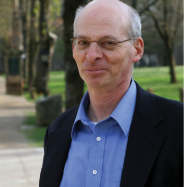American Thinker
 In the heat of political partisanship, Richard Baehr '69 keeps cool. He expresses his conservative outlook with calm assurance backed by facts instead of rants. "My goal is to persuade people, and you don't persuade people by screaming at them," Baehr said.
In the heat of political partisanship, Richard Baehr '69 keeps cool. He expresses his conservative outlook with calm assurance backed by facts instead of rants. "My goal is to persuade people, and you don't persuade people by screaming at them," Baehr said.
As co-founder of and chief political correspondent for the American Thinker, a daily Internet publication attracting site visits from more than 1.5 million people a month, Baehr aims to stand out as a voice of civility on the right, opining on politics, national security, foreign policy, economics, and culture.
He is a popular speaker at colleges and conferences and a frequent guest on nationally syndicated talk radio programs such as The Dennis Miller Show and The Michael Medved Show. Earlier this year, the New York Times identified him as one of the most prominent conservatives in "Obama's Chicago." Not bad for a guy who only moonlights as a pundit. Baehr has spent thirty-five years as a management consultant in the health care field and is president of Richard Baehr and Associates in Chicago, advising hospitals on planning and finances.
His entry into the higher-profile world of political analysis began modestly with a listserv focused on the Middle East in the early '90s. As his e-mail group grew to hundreds of readers, Kenyon classmate Tom Lifson suggested he needed a broader audience. In 2004, they launched the American Thinker, eventually corralling contributions from two hundred writers. "I think we have one of the most thoughtful online forums out there," Baehr said.
He credits his Kenyon years as a political science major in the '60s for shaping his worldview and arousing his intellectual curiosity. "The way I reason through complex issues comes from the Socratic approach at Kenyon, particularly as practiced by professor Harry Clor, who would not let me get by with just a surface answer. I was poked and prodded to give fully developed responses. I became a better thinker and BS detector," he said.
Baehr opposed the Vietnam War but commends Kenyon for staying open in the spring of 1970, when other campuses closed due to student protests over U.S. expansion of the war into Cambodia. "At that time, the political science department and Kenyon's high-scoring basketball team were the central areas of excitement at the school," he said. "Kenyon held seminars on the war, while other colleges succumbed to student anarchy."
Baehr stayed active at Kenyon after graduation, serving on the Alumni Council, the Board of Trustees, and the Kenyon Fund Executive Committee. He helped create the Kenyon Committee for Liberal Education, an alumni group in the mid-80s that challenged what it saw as the burgeoning politicization of the curriculum and what it viewed as the College's drift toward becoming an activist school.
Raised in a Jewish household in the shadow of Yankee Stadium in New York City, Baehr "was brought up to appreciate that for the first time in 2,000 years, Jews had a state of our own." The Six-Day War in 1967, which occurred while he was a student at Kenyon, and the Yom Kippur War in 1973 heightened his concern for Israeli national security. "Israel is a fragile nation whose long-term survival is not guaranteed," Baehr said.
He remains a critic of Middle East peace initiatives that pressure Israel for concessions to what he characterized as an intransigent Palestinian Authority. In his view, "the Israeli side accepts compromise while the other side believes at some point that Israel will disappear."
His interest in the Middle East "is what got me into this alternative world of political commentary," Baehr said, but he has since expanded the scope of his discourse well beyond that single subject, tackling topics ranging from immigration to sports. While Baehr swears allegiance to conservative principles, he describes himself as a "big-tent person" who's open-minded about some controversial political issues.
For example, he accepts the possibility of man-made climate change, favors expanding access for the uninsured with lower-cost catastrophic health care coverage, and supports the responsible use of nuclear and fossil fuels while the nation makes a transition to alternative energy sources.
Baehr said he strives to restore a more agreeable tone to the nation's divisive debates. "One of the problems in politics today is that the people stick with media sources that reinforce what they already believe, which, at the end of the day, just hardens the views of everyone."
-Dennis Fiely

 Delicious
Delicious Facebook
Facebook StumbleUpon
StumbleUpon Digg
Digg reddit
reddit